By Adagbo ONOJA
The past two decades have opened up every concepts and theories for contestation. One of such is the concept of borders. Once the definitive feature of sovereignty with a taken for granted meaning as far as the international order is concerned, the border is now the most contested concept in the theory and practice of international politics. What is the meaning of the border? Where is it? Is it something real and out there or what the most powerful says it is?
Theoretically, globalisation has no business with borders. But it is under globalisation we see more sophisticated border control mechanisms, much, much beyond the visa to the most panoptic of technology for surveillance, tracking and filtering the movement of people to physical entities such as walls, fences, real and virtual border posts. It is such that Giorgio Agamben, the Philosopher at the University of Venice took umbrage. In March 2004, he was supposed to teach a course at New York University in the United States. He cancelled it because he could not bring himself to leaving his fingerprints upon entry into the country. Fingerprints is what used to be required of criminals. It is now required of normal persons. That, he said, was part of the culmination of the ‘progressive animalization of man’ that another theorist had talked about. His argument is that these practices have very little to do with security but a process by which the state is making “humanity a suspect class”, marking a transition in history from Athens to Auschwitz. Each of Athens and Auschwitz represent completely different but emotively powerful experience in European History. He published his displeasure in Le Monde on January 10th, 2004 under the title “No to Bio-political Tattooing”.
As a European professor, he could afford to say to hell to whomever. For the Africans, professors and hoi-polloi, it can be a different ball game. In Africa, the theory and practice of borders is much more complicated. The worry of many is even to get the visa at all. They are not in the position to mind the tattooing experience. Both within and inside Africa, the African is a victim of border geopolitics. Trying to run away from poverty, wars and crises, they cannot cross the border. And even within Africa, the romanticism of ‘we are all Africans’ is no longer sustainable as the reality of banditry, terrorism and traders in human beings stare that romanticism in the face. So, how does an African country with claims to continental leadership such as Nigeria cope with these contradictory challenges? What is the problem with migration and, by implication, borders, as far as the African is concerned?
In the week that the United Nations gets on with cracking the complications of migration, Intervention took up these questions in two ways. The first is the reproduction of an African’s story of migration and everything it invokes. That is the opinion piece in the CLINCHER column by Winnie Byanyima. The second is the interview with two of those who are paid to study and research such questions. In other words, how do the men and women of ideas see it and where is the meeting point between them and the policy mill, notwithstanding the folly of such a dichotomy.
Dr. Willie Aziegbe Eselebor teaches courses in the Border, Humanitarian and Refugee Studies component of the Institute for Peace & Strategic Studies at the University of Ibadan from where he holds a PhD in Peace and Conflict Studies. Additionally, he attained the position of Assistant Comptroller of Immigration with the Nigerian Immigration Service (1980-2012) before his migration into academia. So, much of his theorising is informed by what he has experienced firsthand.
The immediate past President of the Society for Peace Studies and Practice (SPSP) 2011-2016 has also been a senior research Fellow of the Institut Francais de Rechercheen Afrique (IFRA) and the Historical Society of Nigeria (HSN) aside from consulting experience with such bodies as the European Union, the ECOWAS, the International Organisation for Migration, (IOM), among others.
Professor Bawuro Barkindo is just leaving the services of the University of Abuja where he taught History. A product of the Ahmadu Bello University, Zaria School of History and, for many years, a lecturer in History at Bayero University, Kano before moving into the National Boundary Commission, Barkindo is very much at home with border intellectualism. Being so busy, it takes time to pin him down. But talking to him takes one back to the generation of scholars of border studies symbolised by Anthony Asiwaju, the author of the best seller, Partitioned Africans: Ethnic Relations Across Africa’s International Boundaries, 1884 – 1984, among others. Barkindo is most likely the last of that generation.

West-African-migrants-daring-the-desert-in-Pick-up-trucks-from-Agadez
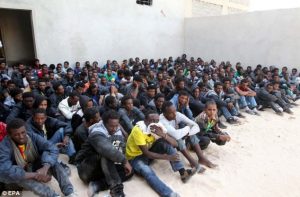
African migrants at a detention center in Libya
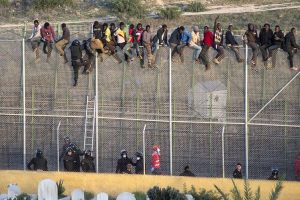
Migrants set for confrontation with Spanish Border Police standing between them and the perceived wonderland
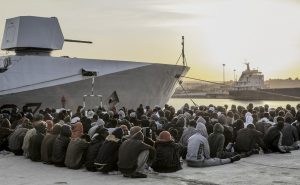
A pix from the Atlantic showing disease checked and photograpghed sub-Saharan Africans in Augusta,Sicily,Italy
Dr Willie Eselebor:
In Africa, migration under globalisation is a problem. Contrary to the borderless world notion, the African cannot move out that easily and neither is the movement within that freely. Where do you situate that problem?
Migration is not a problem but the management. If it is lawful, it is not a problem but if it is clandestine and undocumented, then it calls for concern because then all the variables come in – the economic, the political and the security. For us scholars in that field, we need good border management to filter what goes in and out of the country. Globalisation will be a plus in that case. If not, then we would not derive anything from globalisation.
There is something contradictory in globalisation that talks about a borderless world but in which the control system on migration is growing in Europe, in North America, especially for the Africans.
Globalisation is not a problem per se. We cannot dictate to other nations, how to manage their flows. The problem in Europe, for example, is driven largely by the push and pull factors. Poverty, wars and conflicts underpin the flow pattern. Transnational organised crime too. So, these are complex pressures at play which are not affecting Africans, only but the rest of Europe. There are other categories of migration flows from breakaway Soviet republics pouring into Europe.
There is no agreement as to the reasons or criteria for the check. Some people emphasise it is security, others say it is economic exclusion and some insist it is racism
Every nation has the right to determine policies regarding immigration control. If you are not going to be a liability to the receiving country, it normally doesn’t become a problem. What their regimes ask for is whether you have visible means of livelihood. They have already planned for their health, water supply, energy consumption and so on. So, you will be regarded as an economic migrant if you enter as an undocumented traveller or you overstay your visa. If you have visa that does not match with the reason for your entry or stay, then you become undocumented and unwelcome in that society. It is not like Nigeria that is liberal to all categories of migrants, especially of African extraction. Even when you are going to Benin Republic, you will be checked against certain criteria of admission and the local delegates will document your stay in their community. In Europe, they are performing their lawful duty, within the dictates of their immigration law. In Africa, we need to follow due process as well and deter unlawful migration. And that is beginning to happen now under this new dispensation. Even here, we have Chinese, Indians, Lebanese and other nationals, who do not have valid travel documents, but yet are domicile here in Nigeria. The only thing is the number is so small. It is not on the same scale, like Africans who may have travelled outside the continent. So, issues of removals (repatriation and deportation) are less publicised. They are merely taken to the holding facility and eased out of our borders by the Nigeria Immigration Service.
You don’t then see migration or border control practices of nowadays as a filtering process underpinned by politics
It is a technical issue. Visa is a control measure. Even when you are granted visa, it still has conditions attached. It does not grant you automatic admission. The immigration officer still retains the discretion to determine admissibility. In America, Trump is talking of about two million illegal immigrants in the country. One day, we woke up here and said ‘Ghana Must Go’. It is always a national concern and what drives it at any one moment could vary from security to economic or political reasons. On the other hand, most people who migrate do so for the same security or economic reasons. A lot of Nigerians who go out would stay back if the state is well organised. After all, most parts Europe is cold. But as things stand today, Nigerians would go anywhere they can find jobs. Just like the Indians, the Pakistanis and other groups that run from war torn countries or economic crisis. And they may be more than Nigerians in Europe. The flow pattern is always very interesting. Most migrants fleeing from war like in Syria transit through Turkey, Greece and head for Germany which is where the economy is stable. You won’t find jobs that much in China and that explains why migration to China is not on that scale as across the Mediterranean. In most cases, it is when migration becomes a security challenge that they are raiding Africans, profiling them, trying to check for terrorist tendency. There is, however, a political economy to it. In South Africa, the perception is that of Nigerians have moved in to take over jobs, their women and facilities. So, they react. It is the political economy that drives xenophobia. So, migration itself is not the problem when lawful, but when it is unlawful, it becomes a security threat.
But power decides what or when it is lawful.
There are extant laws in a third country that classify your status, whether you are a tourist, student, visiting or you are there with valid work permit. Some migrants may be running away from conflict, war specifically or even natural disaster. But if you are being smuggled, meaning you don’t have valid travelling documents, sufficient means of livelihood, return ticket, then you become an undocumented migrant. Otherwise, nobody is going to query you. The problem has been compounded by the transnational nature of organized crime. It has become so easy to prepare false documents, arrange visa and move large number of people through the high seas. So, there is high incidence of clandestine migration and it is criminalised under transnational crimes such as smuggling of human beings or trafficking in persons. Most countries are signatories to those protocols.
The African exceptionalism is that this exclusionary practices as it affects them is both ways, within the continent and outside
I just came back from an African Union project on ending visa restrictions by January 2017. We were working on the protocols and other documents thereto with the European Union and where it was suggested that in Africa, the visa issue should be a thing of the past soon, depending on how the policy actors move. I think everyone agrees that movement within Africa should be less burdensome and there is the need to abolish restrictions to free movement of persons, goods and services. Some African countries are already doing that. Even if visa restrictions do not end by January, the regime would most likely have shifted to visa on arrival policy.
To what extent does that take into consideration the security fear that comes with unrestricted movement? We are being reminded that the idea of ‘we are all Africans’ has been questioned by contemporary trends in crime, terrorism and banditry. How does a country such as Nigeria handle this conflicting situation?
We do not have a comprehensive border policy as I speak. Nigeria doesn’t even know its number of borders. There are about 87 lawful crossing points (recognised borders) but about 1470 unauthorised routes and it keeps increasing. The entire northeast of Nigeria is porous. It has the largest expanse of land borders. Our borders with Benin Republic are at best safer, but small. To police our borders effectively is difficult because we do not have the technology, the manpower or the infrastructure. And what is the budget for the development of good border management? There are no barracks. How do you expect them to perform? It’s just too vast and technically impossible to police. Technology and infrastructure are needed. In Europe, they have good border management regime. FRONTEX provides security for EU borders. We don’t have that sort of facility in ECOWAS. In 2012, we did a Risk Assessment on Nigeria – Niger Border with IFRA-NIGERIA and one of the outcomes is that most undesirable elements come in through Niger-Chad axis. They are renegade fighters dislodged by the Arab-Spring from Libya. So, we need to do more on our borders because until our borders are safe, even the economic crisis we are talking about cannot be confronted. Smuggling of textiles, rice, poultry and other related goods would continue to create problems in the domestic arena and I don’t see what the border guards can do in the northeast, if the required technology is not in place to effectively manage our borders.
What would you want to see Nigeria do on borders?
Borders have changed. During the Cold War, there was a policy on borders. By 6 – 7 pm, borders were closed. Now, we have globalised borders. How do we manage the borders? We need a policy that is futuristic; that can anticipate and enable us to know where we are presently or who is an enemy, where smugglers are dumping goods and which country to hold accountable for whatever criminality that is taking place. We need a do thorough Needs Assessment. As of now, immediately a certain good is banned in Nigeria, it is our nationals in collaboration with saboteurs who go to Benin Republic to bring the same goods into the country. Benin, Niger and Chad do not pay duties on goods arriving these countries from France. Some saboteurs produce these goods in France or China and label them as goods with origin from ECOWAS member state, which means that you are paying nothing more than 0.5% of administrative charges; and you are in business in Nigeria. So, Nigeria needs to engage with her neighbours and re-strategize for the future.
What is your grand concept for that engagement?
Perhaps such a grand concept would emerge from the coming together of experts from various fields to prepare a road-map on how to make the borders safe and smart. We need a high-level and consistent policy on border security. The government is just settling down. May be when it has overcome present challenges, they would be able to address their mind to such areas of good border management, which includes the security component. It is not only land borders that are problematic. Our maritime borders are also unsafe, yet little attention is paid to the Gulf of Guinea. Criminalities common to maritime borders include piracy and crude oil theft among others. Airports are relatively safe, but our land and sea frontiers are problematic because we do not have the technology. Policy making needs to engage identified critical areas and it is important we secure our future

Pres.Buhari with leaders of Nigeria’s contigous borders

The map of Nigeria & her neighbours
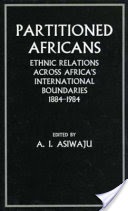

Dr Eselebor

Manning the border
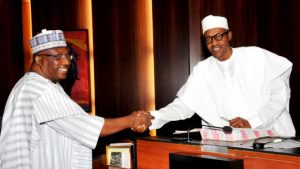
Minister of Interior,General Danbazzau in a handshake with Pres.Buhari

Angela Merkel of Germany
Professor Bawuro Barkindo
What is the problem with migration, especially for the Africans, at a time it should be a borderless world ?
One is to, on the whole, see how the Europeans are falling over themselves to accept migrants from Syria, Afghanistan and other Arabs from Middle Eastern countries. Look at Merkel of Germany risking everything to do that but ensuring that the African migrants are not there. Two is, you know it, our people have been daring the desert to cross over to Europe. That is a continuation of what has been on. Europeans are simply saying to the Africans: stay where you are and solve your problems. So, there is nothing like globalisation. The African is not accepted. Whoever is caught is returned to Africa.
How do we understand this? Securitisation of migration or economic exclusion or racism?
That I leave to you. They started the problem in Afghanistan and Syria but who started the problem with us in Africa? Why are our people eager to dare the desert? It is colonialism that communicated the idea which represents that world as a coveted world. That is the whole idea today why someone’s daughter or son could now take him before a family meeting for trying to convince the child to stay here. And the family meeting would blame the father for trying to block the young man or young lady from better opportunities. They do not care whether they are going there to do menial jobs and they don’t care how well educated they already are or how totally unskilled they are. So, our own is not a question of going out to explore the world, to get to know the world but going to know the world that you have been brought up to think is the place to see and die. That is the whole idea. I disagree that our people daring the desert to go there are victims of modern slavery or people who were deceived. They know they are going for prostitution. Nobody told them they would get great jobs there. They knew what they were going for and it is because many of us are simply proud that their children are abroad. It doesn’t matter to them what they are doing there.
What does an African country such as Nigeria with claims to leadership do in this situation?
Nigeria has tried to demonstrate leadership by establishing ECOWAS and if we can implement the ECOWAS articles, despite the problems, that would be the first step because ECOWAS depends a lot on Nigeria. We pay so much. And the whole migration comes to Nigeria. Obasanjo woke up one night and closed the Nigeria-Benin borders and called for a meeting with his Beninese counterpart. And they discussed. What Obasanjo found out was that smuggling was taking place on that scale because bringing goods through the Nigerian ports were 5/6 times dearer than through Cotonou. So, they chose to bring the goods there and smuggle them to Nigeria. Nigeria can show leadership by ensuring that ECOWAS succeeds.
How does that respond to the problem you exemplified, which goes beyond smuggling to terrorism and criminality? It is such that people say now that Africans are prevented from migrating from and within the continent because the fear of fear has questioned the notion of ‘we are all Africans’?
If the ECOWAS Treaty could go the whole hog, it would have taken care of that. That is a unified visa document. One of the problems is the border enforcers themselves are not even sensitised on implementing the ECOWAS Treaty. ECOWAS’ border enforcers – immigration, police and the joint teams are yet to inherit the ECOWAS spirit, that people who have farms and relations across borders do not have to go through border formalities.
The argument is that the ECOWAS spirit has become problematic in the age of terrorism
There is a paper I did in 2013. In appraising current efforts to secure the national border, you can employ as many personnel as you want but you cannot prevent people from coming in. So, the best thing is for the countries involved to sit down and integrate the border. The answer to infiltration of criminals and those categories does not lie in rethinking the African commonality. There are things we knew when we were growing up. When we were growing up, the Ward Head informed the Village Head of any new person in his domain whom he didn’t know. The Village Head takes it up to the District Head and so on. So, within a day or two, they can tell you what is up. Now, Ward Heads are not paid salaries. I heard President Buhari talking about it sometimes in the past. Some of you may not understand what he was saying but some of us would do. It is very clear it was the function of that layer of functionaries or whatever you call them. The whole idea is to bring back the old system.
And you are also implying this on the African scale such that a border free Africa becomes sustainable
That’s right
What is the architecture in your mind?
I belong to the Asiwaju School that the best Africa can do is through integration as par the European process that led to the EU. We look at it from the view that even our own states in Africa have boundaries that are artificial. So, we thought we follow the European way, integrate our borders so that there are no more borders. The African Union accepted the idea that since it is difficult to have a united Africa, let us see how the regional organisations could consolidate. This is the way forward we want to see. With Brexit, we see resistance but we think a borderless Africa is the way.
In other words, there is need to rethink the idea of a specifically Nigerian border policy
I did some research for example when Buhari closed the border for about two years in the 1980s. It was very interesting to discover that there was more crossing the border than when they were open. This is irrespective of whether you are talking of vehicles or people. When you close, everybody there from migrants into and out of Nigeria and even the border agents sees an avenue for making money. It was very illuminating to find that there is more traffic across the borders when you announce them closed officially. This is not only through the unmanned channels but even through the same official channels. That is the logic of that position. That is why we are trying to say that whatever globalisation says, the physical border is still there. While accepting globalisation, that physical frontier is there and controlling our life. We have to deal with that problem by coming together through integration. Once we get there, we have minimised the problem you are talking about – to go out is a problem for Africans and even to move within the continent because of borders. When it is not border restrictions, it is fear of fear. I am calling it the name you called it. And we think this is right because they still think about the border when you go to Britain. I have a five year visa but each time I get there, I have to put my fingers on the machine.




























